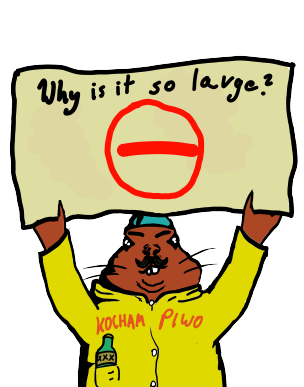


This website use cookies to help you have a superior and more relevant browsing experience on the website. Read more...



Some online content just makes you want to click on it. You’re dying to discover that mysterious fourth rule, to understand why the medical community might lose respect for you (like that time you forgot to show up for an appointment), or find out what that one guy you’ve never met did. These are known as clickbaits. Their success largely relies on the headline alone, while the rest of the content often keeps you hanging, searching for an unsatisfying answer. The fact that you spent enough time on the page boosts its ranking, and the higher it ranks, the more people it reaches. It’s a bit like telling a senior citizen there’s money in the bushes that will blow their socks off, but not specifying where. They’ll keep searching until they find a single coin on a twig. Suddenly, an ecologist (think of them as the Google algorithm) notices that these bushes are strangely valuable because seniors are lingering around them, so they decide it’s time to declare the spot a natural monument.
The first rule on the list is to pique interest by being vague. Your biggest sin is revealing the information in the headline itself. You don’t want to spill how utterly boring your point is—you want to hint at scandal or a list of shocking mistakes the reader is definitely making and must stop immediately!
Imagine you’re at a group gathering and want attention the way clickbaits do. If you giggle, people will assume a fruit fly flew up your nose. If you immediately explain that you’re laughing because someone leaned on a wet part of the table, they’ll just pity you. However, if you roar like a moose in heat while slamming your fist on the table—or the person next to you (on second thought, don’t do that)—they’ll definitely ask what’s going on. You, however, will keep laughing so hard you can’t explain for several minutes. When you finally reveal the hilariously wet elbow story, they might pity you again, but hey, you got their attention, and that’s what matters.
I’d explain the second rule, but migrants are storming the border as we speak! And just now, a distinguished astronaut from the University of Space was murdered on the moon by a cruel homeless man over a beer dispute.
The point is: the more emotions you evoke, the better. Treat your audience like you want them on the verge of a breakdown—anger, excitement, shock, embarrassment! Maybe even relief at the end. It’s like throwing stones at people. Their anger will make them chase you. The same goes for any strong emotion. As emotional beings, we’re drawn to content that stirs us.
If you embrace the third rule, your life will improve for the better! You can’t afford to miss it! Plus, you’ll never have dental problems again!
This rule is about highlighting benefits. Or, more precisely, making promises of revealing secret knowledge or incredible solutions to problems. Sprinkle in a little FOMO (fear of missing out). What if the one piece of life-changing information slips through their fingers forever? The user should feel compelled to visit your page in hopes of a better tomorrow.
The fourth rule. Watch your head. Enough jokes. Seriously though, you’re lucky to be reading this article. I’m about to share information that journalists have kept secret for centuries!
You need to create a sense of exclusivity. Like a cult member believing they’ve been chosen to receive sacred knowledge, you must make your audience feel special. They’re among the chosen few to learn this incredible secret. It’s like knowing why dads go out for milk and come back seven months later—it’s a big deal. Humans love feeling like they’re part of an elite group with privileged knowledge that others don’t and perhaps shouldn’t have. Use this to your advantage if you want to dabble in clickbait. I personally think it’s an underrated point of social influence.
The fifth rule is more than SPECTACULAR. It impacts 93% of users in an astonishingly significant way. It’s about using powerful words and numbers—very specific ones, ideally odd numbers (except 5). This creates an impression of precise, reliable data. For instance, the number 93 here is random, and I wouldn’t recommend trusting clickbait stats. The point is to sound specific, and you can always claim it was discovered by American scientists, who, as we all know, have the best and most energetic research teams (thanks to donuts). In truth, this is two rules combined, but presenting too much info at once might scare readers away. You could break this content into 30 rules, adding fluff to pad it out, but far fewer people would bother reading such an extensive piece. With these rules, you’ve gained incredible, secret knowledge that will transform your career. I truly wish you all the best with it. If you want to unleash your creative potential like a beast from the depths of the wardrobe, don’t forget to try this amazing tool that boosts creativity by 297%—my animated notepad. :3